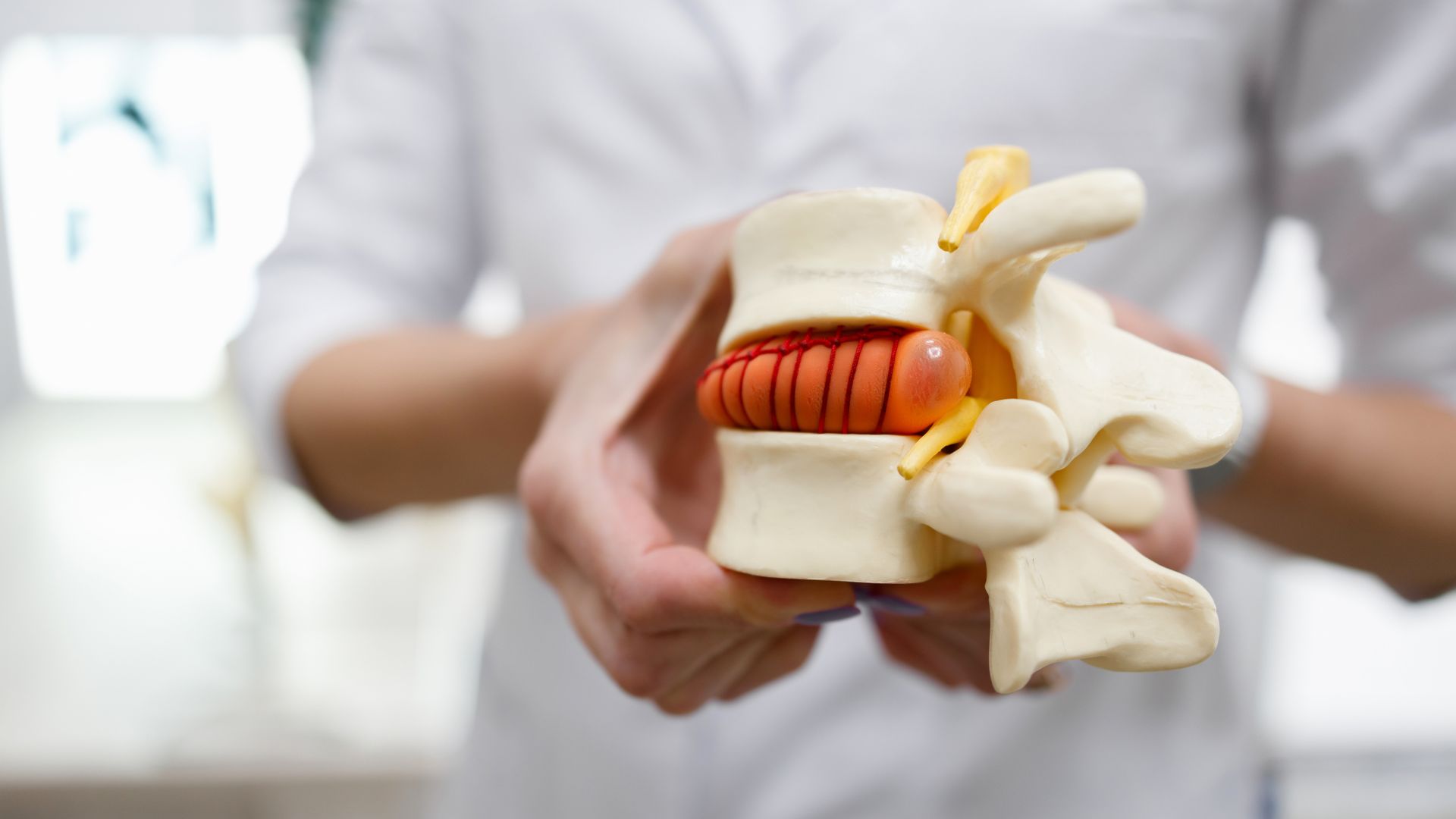
A herniated disc is one of the most common spinal problems — and also one of the most misunderstood. Many patients come into our clinic worried that their pain means they will need surgery. The truth? Most herniated discs can be managed effectively with conservative, non-invasive care.
At Family Chiropractic of Clark, we help patients every day who struggle with back pain, leg pain, and stiffness caused by disc problems. In this article, we’ll break down what a herniated disc really is, the most common signs, the treatment options available, and the important next steps you should take.
What Is a Herniated Disc?
Your spine is made up of bones (vertebrae) separated by soft, cushion-like discs. These discs act like shock absorbers, keeping the spine flexible and protecting nerves.
When a disc’s outer layer weakens or tears, the soft inner material can push outward. This is called a herniated disc (sometimes referred to as a slipped or ruptured disc).
Depending on where the herniation occurs, it can press against nearby nerves — causing pain, tingling, or weakness.
Common Signs of a Herniated Disc
Not every herniated disc causes symptoms, but when they do, they often include:
- Sharp back pain that worsens with bending or twisting
- Pain radiating down the leg (sciatica) if the disc affects the lower spine
- Neck pain radiating into the shoulders or arms (cervical herniation)
- Numbness or tingling in the extremities
- Muscle weakness, making it hard to lift or hold objects
- Pain that feels worse after sitting for long periods
If pain is severe, constant, or combined with loss of bladder/bowel control, seek immediate medical attention.
Risk Factors for Disc Herniation
While anyone can develop a herniated disc, certain factors increase the risk:
- Age-related degeneration of discs
- Poor posture or long hours of sitting
- Repetitive lifting or twisting movements
- Sudden injury or trauma
- Lack of core strength and flexibility
Lifestyle changes, along with targeted care, can reduce flare-ups and protect spinal health.
Care Options for a Herniated Disc
The good news? Most herniated discs improve without surgery. Here are the most effective, conservative options:
1. Chiropractic Adjustments
Gentle spinal adjustments help realign vertebrae, relieve nerve pressure, and restore mobility. Many patients experience relief after just a few visits.
2. Flexion-Distraction Therapy
This specialized technique gently stretches the spine, reducing disc pressure and encouraging healing.
3. Targeted Exercises and Rehabilitation
Strengthening core muscles and improving flexibility help stabilize the spine and prevent recurrence.
4. Soft Tissue Therapy
Massage and myofascial release reduce muscle tension that often worsens disc-related pain.
5. Lifestyle and Posture Coaching
Simple changes — from ergonomics at work to sleeping positions — can significantly improve long-term spinal health.
6. Medical Options (if needed)
In some cases, doctors may recommend anti-inflammatory medications, injections, or, rarely, surgery. However, most patients find natural chiropractic care effective without needing invasive procedures.
At-Home Self-Care Tips
While professional care is key, you can support recovery with safe home practices:
- Apply ice packs during acute pain to reduce inflammation.
- Switch to heat therapy later to relax tight muscles.
- Avoid heavy lifting and sudden twisting.
- Take short walks instead of prolonged sitting.
- Sleep with a pillow under your knees (if on your back) or between your knees (if on your side).
Next Steps: When to See a Chiropractor
If you suspect a herniated disc, don’t wait for the pain to “just go away.” Early care can prevent the condition from worsening and speed recovery.
At Family Chiropractic of Clark, we start with a comprehensive exam and, if needed, imaging to confirm the diagnosis. From there, we design a personalized care plan tailored to your body, your lifestyle, and your health goals.

Why Choose Family Chiropractic of Clark?
- Gentle, effective techniques that avoid drugs and surgery
- Personalized treatment plans for every patient
- A focus on long-term spinal health and prevention
- A caring team committed to restoring your comfort and mobility
Take the First Step Toward Relief
Living with a herniated disc doesn’t mean you have to live with constant pain. Relief, healing, and a return to normal activities are possible — often without invasive treatments.
👉 Schedule your appointment today with Family Chiropractic of Clark and take the first step toward a healthier spine.
Final Thoughts
A herniated disc can be frustrating, painful, and disruptive — but with the right care, it doesn’t have to control your life. Through chiropractic adjustments, guided exercises, and supportive lifestyle changes, you can experience both immediate relief and long-term results.
Don’t wait until your symptoms worsen — your journey to healing starts today.
